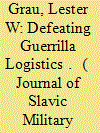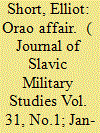|
|
|
Sort Order |
|
|
|
Items / Page
|
|
|
|
|
|
|
| Srl | Item |
| 1 |
ID:
158505


|
|
|
|
|
| Summary/Abstract |
This article is devoted to the intelligence activities of the Russian Embassy in Paris on the eve of and at the beginning of the war between Russia and France in 1812. The author has introduced into scholarly circulation a large set of unpublished documents stored in France’s National Archives and the Archive of the Ministry of Foreign Affairs and has come to the following conclusions. On the eve of and beginning of the War of 1812 the Russian Embassy in Paris, led by the ‘brilliant’ Prince A. B. Kurakin, played a very important role in the plan for Petersburg to obtain valuable information about the plans and operations of the adversary. Contrary to previous impressions, when the prince was depicted as a kind of ‘dummy’ or, in the best case, a ‘cover’ figure, convincing facts contained in French archive documents add a truly dramatic nuance to this historical personage. Possessing a political flair and extensive connections in Europe and the United States, Kurakin was able to quickly and precisely understand the true meaning of Napoleon’s actions and words and to inform Petersburg about this in a timely fashion. The Russian Embassy in Paris was the main center for the collection and analysis of varied information that attested to the French leadership’s sequential preparations for war against Russia. Despite the widespread opinion about the key role of Colonel A. I. Chernyshev in obtaining secret information about Napoleon’s war machine, the true ‘resident’ in Paris was, nevertheless, Kurakin. Moreover, Chernyshev’s ill-conceived and reckless actions threatened the embassy’s fulfillment of its intelligence functions. However, despite the emergence of serious problems associated with the disclosure of the ‘Chernyshev-Michel group’, Kurakin continued to actively collect intelligence about both Napoleon’s actions and plans and the domestic situation in France itself. Under conditions of the commencement of war between the two powers and his actually being a hostage, the prince did not cease his efforts to collect information and find methods for delivering it to the Russian leadership.
|
|
|
|
|
|
|
|
|
|
|
|
|
|
|
|
| 2 |
ID:
158500


|
|
|
|
|
| Summary/Abstract |
Missile defenses have been bones of contention in past arms control negotiations as between the United States and Russia. The likelihood is that ballistic missile defenses (BMD) for protection of the U.S. homeland or for the defense of regional allies in Europe and elsewhere will be of greater interest in view of their maturing technologies and emerging regional threats. On the other hand, the deployment of next generation missile defenses is not an isolated issue. From the standpoint of nuclear deterrence, missile defenses are embedded within a larger framework of emerging technologies, including those for conventional prompt global strike, for cyber warfare, and for the modernization of offensive strategic nuclear forces.
|
|
|
|
|
|
|
|
|
|
|
|
|
|
|
|
| 3 |
ID:
158503


|
|
|
|
|
| Summary/Abstract |
In preparation for withdrawing from Afghanistan, the Soviets targeted key guerrilla logistics trans-shipment depots located in remote, difficult-to-access regions. One of these was located on the Iranian border in the vicinity of Herat. The Soviet 40th Army and Armed Forces of the Democratic Republic of Afghanistan launched a successful, hard-fought battle to take down this mountain fortress and destroyed large amounts of war stocks before withdrawing. It was a blow to guerrilla efforts, but was not decisive. Redundant guerrilla logistics networks were able to sustain the guerrilla effort following the battle.
|
|
|
|
|
|
|
|
|
|
|
|
|
|
|
|
| 4 |
ID:
158501


|
|
|
|
|
| Summary/Abstract |
Kaliningrad Oblast is one of the most telling examples related to practical implementation by the Russian Federation of the US-coined concept that came to be known as Anti-Access/Area-Denial (A2/AD). This westernmost Russian region, which has been detached from the rest of the country since 1991, used to be one of the most heavily militarized spots in the world in 1945–1991. After 1991, it lost much of its military potential yet has now regained it, becoming Russia’s most advanced military stronghold. This article analyzes the essence of this transformation through tackling the issue from three different angles. First, it provides theoretical discussion on the essence of the A2/AD concept and its applicability to Kaliningrad. Secondly, it discusses the main historical milestones related to the transformation of Kaliningrad Oblast into Russia’s military stronghold. Thirdly, it assesses the impact of the post-2014 events on Kaliningrad in terms of military buildup.
|
|
|
|
|
|
|
|
|
|
|
|
|
|
|
|
| 5 |
ID:
158504


|
|
|
|
|
| Summary/Abstract |
This article will address the creation and two-year existence of the so-called ‘Lokot’ Republic’ in Russia between 1941 and 1943. Though fully within German-occupied territory and the rear area of the 2nd Panzer Army, it was afforded a limited degree of self-autonomy that resulted in the creation of a statelet with its own government departments, armed forces, laws, schools, hospitals, and cultural life. The experiment was regarded by its defenders as a preliminary step toward Russian independence in the post-war European ‘New Order’, and today many historians argue that an opportunity existed for the Russian people to overthrow the Stalinist regime with German assistance and replace it with a viable alternative. However, such a view discounts the will of the most important figures in the German political leadership — above all, Adolf Hitler — who were determined to promptly initiate eventual National Socialist aspirations of an empire in the East colonized exclusively by Germans and ‘kindred’ nations. The study findings are based on archival material as well as current Russian and German research on the subject.
|
|
|
|
|
|
|
|
|
|
|
|
|
|
|
|
| 6 |
ID:
158506


|
|
|
|
|
| Summary/Abstract |
Massive recent archival releases by the Ministry of Defense of the Russian Federation promise to revolutionize the historiography of the Soviet-German War, 1941–1945. Hitherto, heavily censored Soviet books and articles concealed much of the detail concerning how and why the Red Army operated as it did during wartime. Although these sources revealed considerable detail concerning the Red Army’s wartime military successes, they contained precious little about less-successful or clearly unsuccessful operations or numbers and figures related to the strength and losses of Red Army forces. This forced historians studying the war to rely heavily on German source materials or to ‘read between the lines’ while interpreting existing Soviet books and articles about the war. As the details in the following article indicate, this situation has drastically changed for the better, while doing so necessitating a thorough re-evaluation of the performance of the Soviet Union’s Red Army during its so-called Great Patriotic War.
|
|
|
|
|
|
|
|
|
|
|
|
|
|
|
|
| 7 |
ID:
158502


|
|
|
|
|
| Summary/Abstract |
Following Dayton, three ethnocentric armies remained in Bosnia and Herzegovina, presenting a significant obstacle to the consolidation of the multi-ethnic Bosnian state. This article examines the development of the separate armies and the reform process that ultimately unified them. It will contend that such progress would not have been possible without the political fallout that followed the revelation that a Bosnian company had been conducting trade with Iraq in contravention of a UN embargo prior to the 2003 invasion. Faced with the threat of international sanctions, local and international actors moved rapidly to overhaul the defense sector, resulting in the military integration of the three armed forces and the creation of a single army answerable to the Bosnian state.
|
|
|
|
|
|
|
|
|
|
|
|
|
|
|
|
|
|
|
|
|